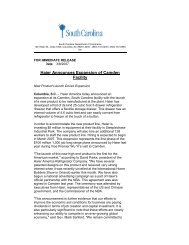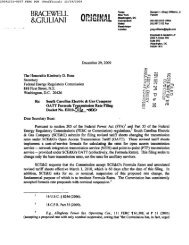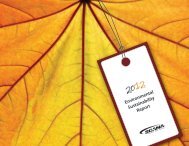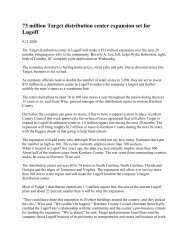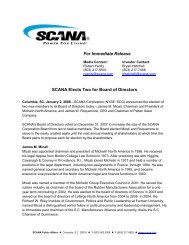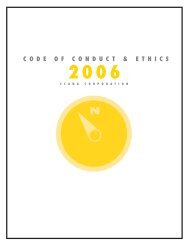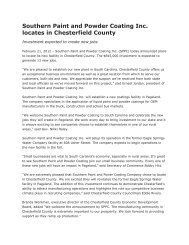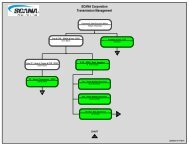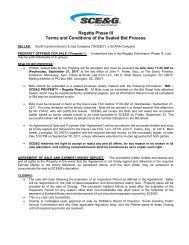10-K - SCANA Corporation
10-K - SCANA Corporation
10-K - SCANA Corporation
You also want an ePaper? Increase the reach of your titles
YUMPU automatically turns print PDFs into web optimized ePapers that Google loves.
Table of Contents<br />
One rating agency, by action taken in 2011, downgraded both the short-term and senior unsecured long-term debt of<br />
<strong>SCANA</strong>. These downgrades have increased <strong>SCANA</strong>’s short-term borrowing rate and decreased the average maturity of its short-term<br />
debt, and may have the effect of increasing <strong>SCANA</strong>’s long-term borrowing rate. Although access to the short-term market has not<br />
been adversely impacted, this could change under different market conditions.<br />
<strong>SCANA</strong>’s leverage ratio of long- and short-term debt to capital was approximately 58% at December 31, 2011. <strong>SCANA</strong> has<br />
publicly announced its desire to maintain its leverage ratio at levels between 54% and 57%, but <strong>SCANA</strong>’s ability to achieve and<br />
maintain those levels depends on a number of factors. In the future, if <strong>SCANA</strong> is not able to achieve and maintain its leverage ratio<br />
within the desired range, the Company’s debt ratings may be affected, it may be required to pay higher interest rates on its long- and<br />
short-term indebtedness, and its access to the capital markets may be limited.<br />
Operating results may be adversely affected by natural disasters, man-made mishaps and abnormal weather.<br />
The Company has delivered less gas and received lower prices for natural gas in deregulated markets, and consequently<br />
earned less income when weather conditions have been milder than normal. During 20<strong>10</strong>, the SCPSC approved SCE&G’s<br />
implementation of an eWNA on a pilot basis. Mild weather in the future could diminish the revenues and results of operations and<br />
harm the financial condition of the Company and SCE&G if the eWNA is not extended on a permanent basis. In addition, for the<br />
Company and Consolidated SCE&G, severe weather can be destructive, causing outages and property damage, adversely affecting<br />
operating expenses and revenues.<br />
Natural disasters (such as the 2011 earthquake and tsunami in Japan) or man-made mishaps (such as the San Bruno,<br />
California natural gas transmission pipeline failure or the Kingston, Tennessee coal ash pond failure) could have direct significant<br />
impacts on the Company and Consolidated SCE&G and on our key contractors and suppliers or could indirectly impact us through<br />
changes to federal, state or local policies, laws and regulations, and have a significant impact on our financial position, operating<br />
expenses, and cash flows.<br />
Potential competitive changes may adversely affect our gas and electricity businesses due to the loss of customers, reductions in<br />
revenues, or write-down of stranded assets.<br />
The utility industry has been undergoing structural change for a number of years, resulting in increasing competitive<br />
pressures on electric and natural gas utility companies. Competition in wholesale power sales has been introduced on a national level.<br />
Some states have also mandated or encouraged competition at the retail level. Increased competition may create greater risks to the<br />
stability of utility earnings generally and may in the future reduce earnings from retail electric and natural gas sales. In a deregulated<br />
environment, formerly regulated utility companies that are not responsive to a competitive energy marketplace may suffer erosion in<br />
market share, revenues and profits as competitors gain access to their customers. In addition, the Company’s and Consolidated<br />
SCE&G’s generation assets would be exposed to considerable financial risk in a deregulated electric market. If market prices for<br />
electric generation do not produce adequate revenue streams and the enabling legislation or regulatory actions do not provide for<br />
recovery of the resulting stranded costs, a write-down in the value of the related assets would be required.<br />
The Company and SCE&G are subject to risks associated with changes in business and economic climate which could adversely<br />
affect revenues, results of operations, cash flows and financial condition and could limit access to capital.<br />
Sales, sales growth and customer usage patterns are dependent upon the economic climate in the service territories of the<br />
Company and SCE&G, which may be affected by regional, national or even international economic factors. Some economic sectors<br />
important to our customer base may be particularly affected. Adverse events, economic or otherwise, may also affect the operations of<br />
key customers. Such events may result in the loss of customers, changes in customer usage patterns and in the failure of customers to<br />
make timely payments to us. The success of local and state governments in attracting new industry to our service territories is<br />
important to our sales and growth in sales, as are stable levels of taxation (including property, income or other taxes) which may be<br />
affected by local, state, or federal budget deficits, adverse economic climates generally or legislative or regulatory actions. Budget<br />
cutbacks also adversely affect funding levels of federal and state support agencies and non-profit organizations that assist low income<br />
customers with bill payments.<br />
In addition, conservation efforts and/or technological advances may cause or enable customers to significantly reduce their<br />
usage of the Company’s and SCE&G’s products and adversely affect sales, sales growth, and customer usage patterns.<br />
19



